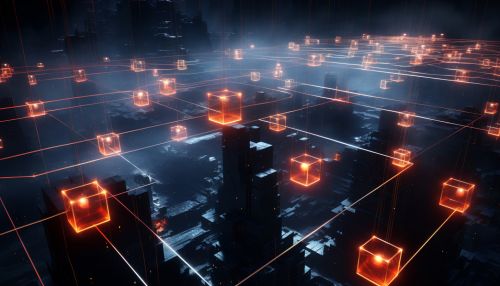Quantum Internet
Introduction
The Quantum Internet refers to a theoretical system of interconnected quantum computers that uses quantum signals to send information rather than classical signals. The concept is based on the principles of quantum mechanics, including quantum entanglement and quantum superposition.


Quantum Mechanics Principles
The principles of quantum mechanics are fundamental to the concept of a quantum internet. These principles include quantum superposition and quantum entanglement.
Quantum Superposition
Quantum superposition is a fundamental principle of quantum mechanics that allows particles to exist in multiple states at once. This is in contrast to classical physics, where particles can only exist in one state at a time. In the context of a quantum internet, this principle would allow for the simultaneous transmission of multiple pieces of information.
Quantum Entanglement
Quantum entanglement is another key principle of quantum mechanics, which describes a phenomenon where two or more particles become linked and the state of one particle can instantaneously affect the state of the other, no matter the distance between them. This property could be used in a quantum internet to create a secure communication link between two parties, as any attempt to intercept the communication would disrupt the entangled state and be immediately noticeable.
Quantum Internet vs Classical Internet
A quantum internet would have several key differences from the classical internet. These differences stem from the unique properties of quantum mechanics and the potential capabilities of quantum computers.
Speed and Capacity
One of the main advantages of a quantum internet would be the potential for increased speed and capacity. Due to the principle of quantum superposition, quantum computers can process a vast amount of information simultaneously. This could potentially allow for much faster data transmission rates than are currently possible with classical computers.
Security
Another potential advantage of a quantum internet is increased security. The principle of quantum entanglement could be used to create a secure communication link between two parties, as any attempt to intercept the communication would disrupt the entangled state and be immediately noticeable. This could potentially make a quantum internet more secure than the classical internet.
Challenges and Limitations
Despite the potential advantages, there are several challenges and limitations that must be overcome in order to build a functioning quantum internet.
Technological Challenges
One of the main challenges is the current state of quantum computing technology. While significant progress has been made in recent years, quantum computers are still in the early stages of development and are not yet capable of performing many of the tasks that would be required for a quantum internet.
Physical Limitations
There are also physical limitations to consider. For example, quantum entanglement is a fragile state that can be easily disrupted by environmental factors. This makes it difficult to maintain an entangled state over long distances, which is a key requirement for a quantum internet.
Future Prospects
Despite these challenges, the potential benefits of a quantum internet make it a highly active area of research. Scientists and engineers around the world are working to overcome the technological and physical limitations and make the concept of a quantum internet a reality.
